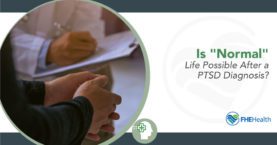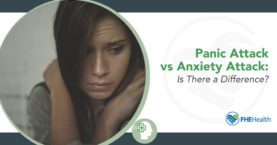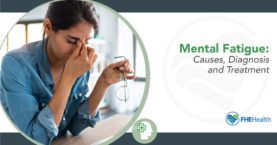Updated 10/17/24 Traumatic events, whether it's a large-scale occurrence such as a war or more personal such as a mugging or assault, can leave an individual feeling vulnerable. Unfortunately, for many people, the distress lasts long after the incident or circumstance is resolved. Months or even years later, the ... Read More
Behavioral & Mental Health
Approximately 18.5% of adults in the U.S. have experienced mental illness. These disorders include depression, anxiety, and bipolar disorder among others. This learning center explores the reality of mental health and the treatment needed. The stigma surrounding this issue prevents people from reaching out for quality help when a better life is possible. Our mental health licensed professionals treat patients with a variety of conditions and inform our topics found in this section.
Is “Normal” Life Possible After a PTSD Diagnosis?
PTSD at Work: Which Jobs Have More of It
Post-traumatic stress disorder (PTSD) can develop after a person experiences a traumatic event that causes injury or leaves them feeling endangered, frightened, or stressed. Traumatic events cause anxiety, disturbing thoughts, trouble sleeping, flashbacks, and difficulty with relationships. Individuals may also develop ... Read More
Panic Attack vs Anxiety Attack: Is There a Difference?
You may have friends who've told you they're having an anxiety attack during a stressful situation. Another friend may have told you about a scary moment during a panic attack. You could be forgiven for assuming both friends were describing the same thing. But they're not. A panic attack and an anxiety attack can have ... Read More
Mental Fatigue: Causes, Diagnosis and Treatment
Mental fatigue affects people from all backgrounds and social demographics. It's reported that about one-quarter of people experience signs of fatigue. Furthermore, research has indicated that women are more likely to experience burnout than men. Mental fatigue can impair your ability to function normally, cause ... Read More
Help for Anxiety and Low Confidence From Imposter Syndrome
Have you ever felt like you didn't belong with a group? Have you been afraid someone might out you as a fraud? These are textbook examples of imposter syndrome anxiety, which is something that affects many people but feels very isolating when it's happening to you. In this piece, we'll explore the way imposter ... Read More
Experiencing Mood Swings? They Could Be This.
For some people, experiencing mood swings is just part of daily life. While you may be managing these rapid mood changes, it's important to identify the root cause so you can improve your overall quality of life. Learn about the signs of mood swings and some common underlying causes you may be unaware of. Once you ... Read More
The New Mental Health Vocab of Neuroatypical, Neurodivergent, and Neurodiverse
It's not uncommon for people who have conditions like autism or ADHD to try to mask their diagnoses or even the way they normally behave or process information. In a world that seems to have clear definitions and rules for what "normal" means, there's long been a stigma associated with many mental health conditions. ... Read More
How Toxic Positivity Can Be Damaging to Relationships
A positive attitude is associated with a lot of benefits, including better heart health, increased productivity, greater success with overcoming addiction and improved relationships. For many people, cutting down on negative self-talk and making an effort to cultivate an optimistic outlook is key to success and ... Read More

















